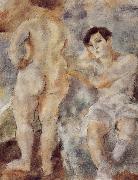
|
Jules Pascin
|
|||
|
|
|||
| Bulgarian-born French Expressionist Painter, 1885-1930,American painter, draughtsman and printmaker of Bulgarian birth, active in France. He attended secondary school in Vienna, returning in 1901 to Bucharest, where his family had settled, and working briefly in the office of his father's grain-merchandizing business. He was, however, already becoming passionately interested in drawing, for which he showed precocious talent. At the age of 16 he became the lover of a woman who ran a brothel and was allowed by her to draw the residents. In 1903 he moved to Munich, where he attended the art school run by Moritz Heymann. | |||
|
|
|||
|
Sister new19/Jules Pascin-334443.jpg Painting ID:: 51466 |
mk219 Oil on canvas 91x71.5cm | ||
|
|
|||
|
Jules Pascin
|
|||
|
|
|||
| Bulgarian-born French Expressionist Painter, 1885-1930,American painter, draughtsman and printmaker of Bulgarian birth, active in France. He attended secondary school in Vienna, returning in 1901 to Bucharest, where his family had settled, and working briefly in the office of his father's grain-merchandizing business. He was, however, already becoming passionately interested in drawing, for which he showed precocious talent. At the age of 16 he became the lover of a woman who ran a brothel and was allowed by her to draw the residents. In 1903 he moved to Munich, where he attended the art school run by Moritz Heymann. | |||
|
|
|||
|
Sister new19/Jules Pascin-978672.jpg Painting ID:: 51530 |
mk219 Oil on canvas 55x38cm 1916 | ||
|
|
|||
|
Gustave Courbet
|
|||
|
|
|||
| 1819-1877 French Gustave Courbet Locations was a French painter whose powerful pictures of peasants and scenes of everyday life established him as the leading figure of the realist movement of the mid-19th century. Gustave Courbet was born at Ornans on June 10, 1819. He appears to have inherited his vigorous temperament from his father, a landowner and prominent personality in the Franche-Comte region. At the age of 18 Gustave went to the College Royal at Besancon. There he openly expressed his dissatisfaction with the traditional classical subjects he was obliged to study, going so far as to lead a revolt among the students. In 1838 he was enrolled as an externe and could simultaneously attend the classes of Charles Flajoulot, director of the ecole des Beaux-Arts. At the college in Besançon, Courbet became fast friends with Max Buchon, whose Essais Poetiques (1839) he illustrated with four lithographs. In 1840 Courbet went to Paris to study law, but he decided to become a painter and spent much time copying in the Louvre. In 1844 his Self-Portrait with Black Dog was exhibited at the Salon. The following year he submitted five pictures; only one, Le Guitarrero, was accepted. After a complete rejection in 1847, the Liberal Jury of 1848 accepted all 10 of his entries, and the critic Champfleury, who was to become Courbet first staunch apologist, highly praised the Walpurgis Night. | |||
|
|
|||
|
Sister new20/Gustave Courbet-999629.jpg Painting ID:: 55497 |
mk242 1839 21x26.5cm | ||
|
|
|||
|
Paul Gauguin
|
|||
|
|
|||
| French 1848-1903 Paul Gauguin Art Locations (born June 7, 1848, Paris, France ?? died May 8, 1903, Atuona, Hiva Oa, Marquesas Islands, French Polynesia) French painter, sculptor, and printmaker. He spent his childhood in Lima (his mother was a Peruvian Creole). From c. 1872 to 1883 he was a successful stockbroker in Paris. He met Camille Pissarro about 1875, and he exhibited several times with the Impressionists. Disillusioned with bourgeois materialism, in 1886 he moved to Pont-Aven, Brittany, where he became the central figure of a group of artists known as the Pont-Aven school. Gauguin coined the term Synthetism to describe his style during this period, referring to the synthesis of his paintings formal elements with the idea or emotion they conveyed. Late in October 1888 Gauguin traveled to Arles, in the south of France, to stay with Vincent van Gogh. The style of the two men work from this period has been classified as Post-Impressionist because it shows an individual, personal development of Impressionism use of colour, brushstroke, and nontraditional subject matter. Increasingly focused on rejecting the materialism of contemporary culture in favour of a more spiritual, unfettered lifestyle, in 1891 he moved to Tahiti. His works became open protests against materialism. He was an influential innovator; Fauvism owed much to his use of colour, and he inspired Pablo Picasso and the development of Cubism. | |||
|
|
|||
|
Sister new20/Paul Gauguin-423764.jpg Painting ID:: 57366 |
mk256 1892 years painting 91 x 68 cm | ||
|
|
|||
|
Ilia Efimovich Repin
|
|||
|
|
|||
| impression artist Russian, 1844?C1930 | |||
|
|
|||
|
Sister new20/Ilia Efimovich Repin-428397.jpg Painting ID:: 57614 |
mk258 1887 years painting 124 x 90 cm | ||
|
|
|||
|
Also Buy::. For Following Paintings / Artists / Products, Please Use Our Search Online: |












